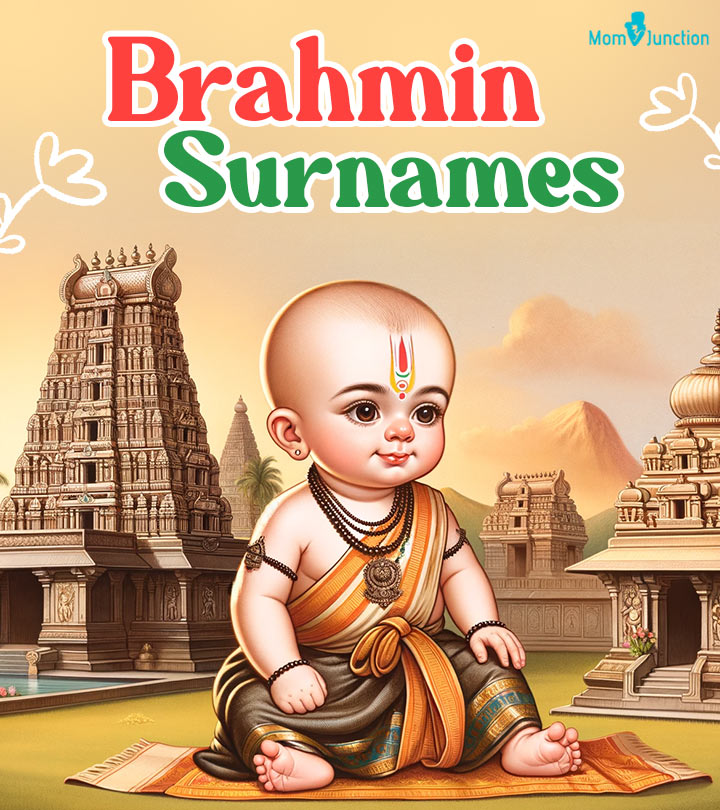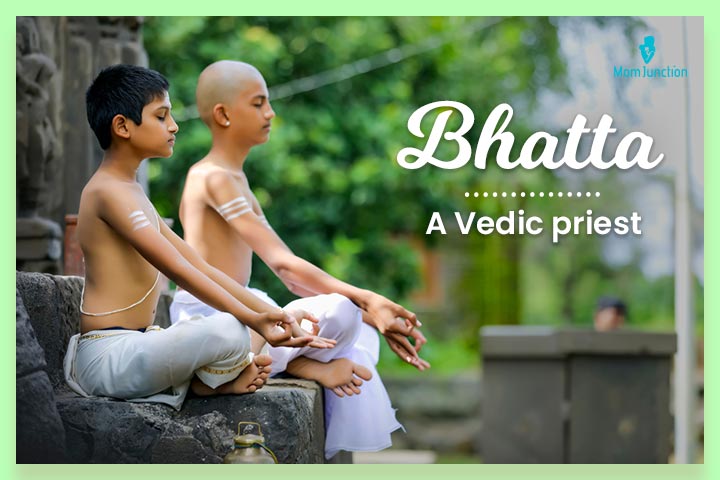Brahmins are known for their long ancestry of traditional priests (known as pujaris, purohits, or pandits) or teachers (called gurus or acharyas). Likewise, most brahmin surnames are inspired by beliefs, birthplace, community, or profession.
Indian literature reveals that only some types of Brahmins were truly committed to priestly duties. In contrast, others were traders, poets, agriculturalists, authors, and landlords or chose various other occupations in India (1).
Browse through this post to explore a comprehensive list of common Brahmin surnames from around the Indian subcontinent.
List Of Most Common Brahmin Surnames By Region
Telugu Brahmin Surnames
1. Bhagavatula
It is a Brahmin surname commonly found in the South Indian states of Andhra Pradesh and Telangana. Its meaning is not listed.
2. Battula
The surname means “soldiers” or “warriors.” It likely has a Sanskrit origin.
3. Chaturvedula
Chaturvedula, a widely used Brahmin surname in India, is predominantly found in Andhra Pradesh and Telangana. It carries the connotations of bravery, logical thinking, and compassion, making it highly significant.
4. Deekshitulu
There are multiple variants of this surname, such as Dheekshithulu, Dekshithulu, Deekshuthulu, and Dikishitulu. The Telugu Indian writer, Deekshitulu Chinta of Dangeru village, is a famous bearer of this last name.
5. Josyula
The last name Josyula is predominantly found in Andhra Pradesh and Telangana, and the meaning is not listed. The surname is said to symbolize proactivity and self-discipline.
6. Navuluri
It is a toponymic surname derived from people living in a village called Navuluri, between Vijayawada and Guntur in Andhra Pradesh.
7. Sharma
The Sanskrit meaning of Sharma is “joy” or “prosperity.” It is one of the common surnames among Indian Brahmins.
8. Sastry
Sastry refers to a scholar and means “one who is proficient in the Sastras” in Sanskrit. The spelling variants are Shastri and Sastri.
9. Saurashtra
Ths surname means “the land of the sun.” The people holding this surname were once sun worshippers and built sun temples.
10. Upadhyayula
Also spelled Upadhyaya, it means “teacher” or “guru” in Sanskrit, and refers to a person who teaches students in Gurukula.
11. Vardhamana
It means “prosperous” or “thriving” in Sanskrit. Vardhamana was the childhood name of Lord Mahavira, one of the spiritual teachers revered in Jainism.
Dwibhashyam, Mishrula, Saraswatula, and Shashtrula are some other common Telugu Brahmin last names.
Bengali Brahmin Surnames
12. Adhikari
The surname Adhikari, meaning ‘officer’ which has its roots in the Indian subcontinent, is predominantly associated with the Brahmin caste. It is prevalent among various communities such as Bengalis, Biharis, Sinhalese, Marathis, Odias, Nepalese, and Kumaonis.
13. Bagchi
Bagchi is a common surname among the Barendra Brahmins of the Sandilya Gotra. Bagchi probably has a toponymic origin and refers to those originally from the historic Varendra region, now part of Bangladesh.
14. Bandyopadhyay / Banerjee
Banerjee is a combination of two elements, “Ban,” a diminutive of Bandoghat village, and “Jee,” a diminutive of “Upadhyaya,” the Sanskrit word for priest. The surname, therefore, refers to “a teacher or priest from the Bandoghat village.”
15. Bhaduri
The surname Bhaduri has a toponymic origin and refers to Brahmins, who originally belonged to the Bhadur village in the Bangaon district of West Bengal.
16. Bhattacharya / Bhattacharjee
Bhattacharya is a noble title bestowed on those who were involved in sacred rituals. The word is a combination of the Sanskrit words “Bhatta,” meaning “Vedic priest” and “Acharya,” meaning “teacher” or “preceptor.” This surname is prevalent in Assam, too.
17. Chakraborty
The Bengali Brahmin surname is formed from the Sanskrit elements, “Chakra,” meaning “wheel” and “Vart,” which means “to roll.” It may metaphorically refer to “a ruler whose chariot wheels roll everywhere without any obstructions.”
18. Chattopadhyay / Chatterjee
It has its origin from the elements, “Chatta,” referring to a village and “Jee,” a short form of “Upadhyaya,” a Sanskrit word that means “priest” or “teacher.” Chatterjee/Chattopadhyay, thus, refers to “a teacher or priest hailing from the Chatta village.”
19. Choudhary
Choudhary is adapted from the Sanskrit element “chaturdhara,” meaning “holder of four,” which denotes a measure of land.
20. Dasgupta
It is an amalgamation of the Sanskrit words “Das,” meaning “devotee” or “servant” and “Gupta,” meaning “protector.” The surname is commonly found among individuals of the Baidya community in West Bengal.
21. Gangopadhyay / Ganguly
This Brahmin surname probably refers to “teachers from the Gangul Village.” It may also be a combination of the Sanskrit words “Ganga,” meaning the “Ganges river” and “Upadhyaya,” meaning “teacher” or “priest.” Thus, the name referred to “teachers or priests by the Ganges river.”
22. Ghatak
Ghatak is a surname commonly seen among Bengali Hindu Brahmins. The term “Ghataks” can be translated to mean “one who brings about events” or “one who makes things happen.”
23. Ghoshal
Ghoshal is derived from the Sanskrit word “Goushal,” meaning “cow-shed.” The surname likely referred to Brahmins, who worked as cow-herders or milkmen.
24. Kanjilal
The surname Kanjilal is well-known among Bengali Brahmins and is primarily found in the Indian states of West Bengal, Jharkhand, and Odisha, with a significant concentration.
25. Lahiri
It is a surname mostly found among Barendra Brahmins of the Sandilya Gotra. Lahiri has a toponymic origin and refers to those who originally belonged to the Laheria village.
26. Maitra / Moitra
Moitra or Maitra likely has a toponymic origin and refers to Brahmins, who originally belonged to the Maitreya village.
27. Majumdar / Mazumdar
Majumdar is a combination of the words “Majmua,” an Arabic word meaning “collection,” and the suffix “dar,” meaning a “keeper” or “possessor.” The surname Majumdar, thus, refers to “an archivist” or “keeper of records.”
28. Mukhopadhyay / Mukherjee
The surname is a combination of the Sanskrit words “Mukhya,” meaning “chief” or “head” and “Jee,” a short form of “Upadhyaya,” a Sanskrit word that means “priest” or “teacher.” he name thus referred initially to a chief priest or headteacher.
29. Roy
The surname Roy is a variant of the surname “Rai,” which means “king” or “ruler” in Sanskrit.”
30. Sanyal
It is a surname common among Barendra Brahmins of the Vatsa Gotra. Sanyal likely has a toponymic origin and referred to Brahmins originally from the Sen Lal village.
31. Tagore / Thakur
The surname Tagore is derived from the surname “Thakur,” originally a feudal title of Sanskrit origin that means “lord” or “master.”
Joardar, Kanjilal, and Patitunda are other common surnames among Bengali Brahmins.
Marathi and Kannada Brahmin Surnames
32. Airani
It is a toponymic surname referring to those who originally belonged to the village of Airani in central Karnataka.
33. Apte
Apte is a common Indian last name predominantly associated with Maharashtrian Chitpavan Brahmins. It originates from the Marathi term “apṭa,” which refers to the yellow bell orchid tree, scientifically known as Bauhinia tomentosa, possessing medicinal qualities.
34. Bhatta
The Marathi surname Bhatta comes from Sanskrit and means “Vedic priest,” “the learned one,” or “scholar.” The surname likely referred to those who had learned all the four Vedas.
35. Desai
Desai is a combination of the Sanskrit words “Desa,” meaning “country” and “Swami,” meaning “lord.” It was an honorary title given to a leader of a village in Maharashtra.
36. Deshmukh
Deshmukh refers to someone who was the head of the district or the chieftain for a region. It means the “head of the state” or “head of the region” in Marathi.
37. Deshpande
The Marathi surname Deshpande is a combination of the words “Desh,” meaning “country” and “Pande,” meaning “accountant.” It originally referred to the district accountant or the head of finances for a region or a kingdom.
38. Fadnavis / Phadnis / Phadnavis
Phadnavis refers to the “maker of lists,” and is derived from two Persian elements, “Fad” and “Navis.” It was an important administrative position during in the kingdoms of Maharashtra.
39. Garge
It is a surname used by the Deshastha Brahmin group that belongs to Maharashtra and northern Karnataka.
40. Gokhale
Gokhale is a surname of Indian origin commonly found among the Chitpawan community of Maharashtra. The name is believed to have originated from the Marathi word “gokhla,” which refers to a circular window and translates to “cow eye” literally.
41. Hegde
Hegde or Hegade is a Kannada Brahmin surname that is derived from the Old Kannada element “pergade,” meaning “chief.”
42. Joshi
It refers to an astrologer and is derived from the Sanskrit word “Jyotisha,” referring to Vedic Astrology and astronomy. The alternative spelling of the surname is Jyoshi.
43. Kulkarni
It is a combination of the Sanskrit words “Kul,” meaning “clan” and “Karni,” meaning “archivist.” The name was originally given as a title to the head of accounts and finances in a village or kingdom. Kulkarni is a surname found in both Maharashtra and Karnataka.
44. Patil
The name refers to a “head” or “chief” in Marathi. It was originally given as a title to a village chieftain or landlord.
45. Padhye
Padhye or Padye is a diminutive form of the Sanskrit word “Upadhyaya,” meaning “priest” or “teacher.” The Padhye Brahmins are even mentioned in the Skanda Purana, one of the Mahapuranas.
46. Rao
The surname is likely derived from the Sanskrit word “Raja,” meaning “king” or “chief.” Rao is a title and a surname found in many other Indian states, such as Maharashtra, Karnataka, Andhra Pradesh, and Telangana.
47. Shrirame
The surname refers to “Lord Rama” or “Lord Vishnu” and is of Sanskrit origin. The alternative spelling of the name is Sriram.
48. Thakur
Thakur, a Brahmin surname among the Rajputs, is employed by affluent communities in India and Nepal. It signifies ‘God’ and is predominantly prevalent in the states of Maharashtra, Bihar, and Jharkhand.
49. Vaidya
The last name Vaidya originates from the Sanskrit term “vaidya,” meaning a knowledgeable individual or a physician. This surname is used by various communities and is specifically associated with the Konkanasth Brahmin clan.
50. Varne
The surname likely originates from the Marathi element “Var,” referring to “above,” “top,” or “supreme.” Another origin of the name could be the Sanskrit word “varnan,” meaning “narration.” The surname may have referred to a chief priest or a highly knowledgeable person.
Gujarati Brahmin Surnames
51. Bhatt
It comes from the Sanskrit word “Bhatta,” meaning “Vedic priest,” “teacher,” or a “scholar.”
52. Dave
The surname Dave is prevalent among the Audichya Brahmins, who are Gujarati Brahmins originating from the state of Gujarat in India.
53. Pandya
Pandyas, with Sanskrit origin, are primarily known for their reverence towards ancestral heroes and signifies a person of scholarly or teaching background. It is predominantly found in the Indian states of Gujarat, Maharashtra, and Rajasthan.
54. Thaker
The surname may be a variant of “Thakur,” a feudal title of Sanskrit origin that means “lord” or “master.” Thaker’s origin is commonly attributed to Kashiraj Thaker, an 11th century Kashmiri Brahmin who traveled to Gujarat to spread Hinduism.
55. Upadhyay
The Hindu Brahmin surname is derived from the Sanskrit title “Upadhyaya,” meaning “teacher of the Vedas” or the “chief priest.”
56. Vyasa
A surname comes from the Sanskrit word “Vyasa,” meaning the “compiler.” The surname would have been associated with those who worked as compilers of ancient texts.
Tamil Brahmin Surnames
57. Dikshitar
It is the surname of a group of Shaivite Brahmins known to be the priests and administrators of the historic Nataraja temple in Chidambaram, Tamil Nadu. The surname likely originates from the Sanskrit word “Diksha,” meaning “to prepare a ceremony” or “to initiate devotional worship.”
58. Gurukkal
The surname is likely derived from the Sanskrit word “Guru,” meaning “teacher” with the suffix “Kkal,” indicating “plurality.” Gurukkals are usually priests at Shiva and Ganesha temples.
59. Iyer / Aiyar
The Iyer Brahmins are a prominent community in Tamil Nadu. They are Srauta-Smartha Brahmins, most of whom follow the Advaita philosophy. Iyer is derived from “Arya,” a Sanskrit word that means “wise,” “noble,” or “honorable.”
60. Iyengar
Iyengars are a prominent Vaishnavite Tamil Brahmin community. The surname has a similar etymology to Iyer since Iyengar is derived from the Sanskrit word “Arya,” meaning “wise,” “noble,” or “honorable.
61. Rajan
The surname “Rajan” is extensively utilized in India and signifies ‘king.’ Its origins can be traced back to the Sanskrit word “rajanah.” Brahmins, Kshatriyas, and other social classes residing in Tamil Nadu and Kerala predominantly adopt this particular surname.
62. Raman
The surname Raman signifies being a “descendant of Raghuvamsa,” which refers to the epithet associated with the Hindu deity Rama, an incarnation of Lord Vishnu. In India, the name Raman is predominantly found in Tamil Nadu, Uttar Pradesh, and Bihar.
63. Vadama
Vadama Brahmins, a sub-group within the Iyer community of Tamil Brahmins, are often referred to as “Northerners.” The name Vadama likely derives from the Tamil word ‘Vadakku,’ which signifies the direction North, indicating that the Vadama Brahmins have their roots in the northern regions.
64. Vathima
Vathima, or Vadhima, represents a particular subdivision within the Iyer community originating from Tamil Nadu, and are classified as Pancha Dravida Brahmin. The term “Vathima” or “Vadhima” is thought to have evolved from the distorted version of “Madhyama,” which translates to the “central part.”
Assamese Brahmin Surnames
65. Acharya / Acharjee
It has its origin in the Sanskrit word “Acharya,” which refers to a “teacher” or an “instructor.”
66. Baruah
It is derived from Borua, the original spelling of the surname. Baruah was a title given to Buruk clan members, who held significant military positions in the historic Chutia kingdom of the Assam region.
67. Bhagavati
Bhagavati comes from Sanskrit and means “fortunate” or “prosperity.” It is also another name of Goddess Durga.
68. Bora
Bora is a common Brahmin surname in the region of Assam, with approximately 88 percent of individuals bearing it. The surname was used as a high military position or title.
69. Gayen
It comes from the Sanskrit word “Gayen,” which means “singer” or the “praiser.” Gayen was likely an occupational surname for bards or those who sang hymns. The alternative spelling of the surname is Gain, and it is also popular in West Bengal.
70. Goswami
Goswami originated from the amalgamation of two Sanskrit words, “Go,” meaning “cattle” and “Swami,” meaning “lord” or “master.”
71. Pathak
Pathak is derived from the Sanskrit word “Pathaka,” meaning “teacher” or “scholar.” The surname is also found among Brahmins of North India.
72. Siddhanta
The surname comes from the Sanskrit word “Siddhanta,” meaning “axiom” or “principle.” The name may have originally referred to teachers and priests.
Bardalai, Khound, Shrutikar, and Tamuli are some other common Assamese Brahmin surnames.
Bihari Brahmin Surnames
73. Chaturvedi
Chaturvedi comes from Sanskrit and means “a person who knows the four Vedas.” It is related to the surname Chaubey and originally referred to the families of saints or rishis.
74. Kashyap
It refers to a rishi (hermit or saint) from whom the eponymous clan has descended. The members of the Kashyap clan are also known as Kanshilyas or Koshyals.
75. Mishra
Mishra is of Sanskrit origin and means “mixed” or “manifold.” The name was used as an honorific title for learned and highly educated individuals. A common variation of this surname is Misra.
76. Ojha / Jha
Ojha or Jha surname is a diminutive of the Sanskrit word “Upadhyaya,” meaning “teacher” or “Vedic priest.”
77. Rai
The surname Rai has its origin in the Sanskrit language, where it signifies the term ‘king.’ During the colonial era, the title of Rai was employed by the Zamindars (landowners) residing in Eastern Uttar Pradesh and Bihar.
78. Shandilya
Shandilya is a Brahmin clan with Rishi Shandilya as their progenitor. This surname may have its roots in the Sanskrit word “Sanatana,” meaning “perpetual” or “eternal.”
79. Tripathi
Tripathi or Tripathy, is a hereditary surname among Hindu Brahmins in India and Nepal. It originates from the Sanskrit term “tripāṭhī,” which signifies a person who has extensively studied the three Vedas.
Jajware, Lakhlani, and Pingal are some other Bihari Brahmin surnames.
Malayali Brahmin Surnames
80. Kurukkal
Kurukkal is a surname referring to a group of Brahmins from the Ambalavasi community, a large Hindu community from Kerala. Kurukkals are said to have originally belonged to the Kingdom of Travancore of Kerala.
81. Namboothiri / Nampoorithiri
Namboothiri is a Vaishnavite Brahmin community native to the state of Kerala. Alternative spellings of the name are Nambudiri, Namboodiri, and Namputiri. Namboothiris are noted for their unique practices and adherence to several Vedic rituals.
82. Nambissan / Nambeesan
Nambissan belong to Kerala’s Pushpaka Brahmin community, who originally performed the task of making floral garlands for a temple’s deity.
83. Pillai
The surname Pillai or Pillay is common among Tamil- and Malayalam-speaking people in India and Sri Lanka. It signifies “child of king or prince” and has ancient lineages that encompass Kshatriyas and Brahmins who embraced martial pursuits.
84. Plappally
It is a surname referring to Brahmins, who migrated to the place called Plappally in Kerala. The place got its name from the name of the Brahmins.
85. Potti
Potti means “deep respect for someone” in Tulu, and is used as a surname by a community of Malayali Brahmins.
86. Unni
Unni is a surname of a group of Brahmins from the Pushpaka Brahmin community. The name Unni originally comes from Sanskrit and refers to a “leader” or “lord.”
Moosathu and Sivadvija are some of the other Malayali Brahmin surnames.
Uttar Pradesh, Uttarakhand, And Other North Indian Brahmin Surnames
87. Agnihotri
Agnihotri comes from Sanskrit and refers to the “one who maintains the sacred fire during the fire rituals.” The surname is found in many parts of North India.
88. Bajpai / Vajpayee
It refers to a Brahmin group from the Kanyakubja Brahmin community, which belongs to the Pancha Gauda major Brahmin group. This surname is predominantly found in the state of Uttar Pradesh.
89. Bharadwaj
The surname refers to those who are descendants of Bharadwaj, a rishi, or sage mentioned in the Vedas. The name Bharadwaj comes from Sanskrit and means “one who has strength or vigor.” Another similar surname is Bhargava, which means “descendants of Bhrigu.”
90. Dikshit / Dixit
It is an adjectival form of the Sanskrit word “Diksha” meaning “to prepare a ceremony” or “to initiate devotional worship.” The surname is also found in other regions of India.
91. Dubey / Dwivedi
Dubey or Dwivedi is a Brahmin surname, which means “versed in two Vedas” in Sanskrit. Some alternative spellings of the surname include Dave, Duvedi, Diwedi, Dubay, Dube, or Dobe.
92. Pandey
The last name Pandey is derived from the Sanskrit word “Pandita,” meaning “learned,” “wise,” or a “spiritual scholar.”
93. Pandit
It is a slightly shortened form of the Sanskrit word “Pandita,” meaning “learned,” “wise,” or a “spiritual scholar.”
94. Pujari
Pujari means “worshipper” in Sanskrit. The name originally referred to those who worked as priests at temples and performed puja, a Hindu devotional ritual.
95. Purohit
Purohit surname comes from Sanskrit and means “the front placed” or the “prime one.” The surname originally belonged to those who became family priests or spiritual advisors to families.
96. Tiwari
It comes from Sanskrit and means “versed in three Vedas.” The other variants of the surname are Tripathi and Trivedi.
97. Shukla
Shukla is of Sanskrit origin and means “bright,” “white,” or “pure.” It is a common Brahmin surname in many parts of North India.
Nayapaul, Nirmal, Siritiya, and Tote are some other common Brahmin surnames in Uttar Pradesh, Uttarakhand, and other regions of North India.
Kashmiri Pandit Surnames
98. Bhan
Bhan is a clan and surname among the Kashmiri Pandits, who are native to the Kashmir Valley in Jammu and Kashmir, India. This surname, which is of Brahmin origin, indicates a profession related to utensil-making, derived from the Sanskrit word “bhajana,” meaning “utensil.”
99. Bhat
The surname comes from the Sanskrit word “Bhatta,” meaning the “Vedic priest,” “the learned one,” or “scholar.”
100. Dhar
It was originally an honorific title for those who held important positions, such as a village chieftain, a warlord, or the head accountant.
101. Haksar
It means a “caterpillar” in Kashmiri. It may have been a colloquial occupational surname of those who grew or sold leafy vegetables.
102. Kak
Kak refers to an “elder brother” in Kashmiri. The name may have originated as a title and later evolved into a surname.
103. Kaul
The name comes from the Sanskrit word “Kaul,” meaning “the one from a noble or aristocratic family.” Alternative spellings for the name include Koul, Kol, and Caul.
104. Kher
The surname “Kher” is predominantly associated with Kashmiri Pandits residing in the Kashmir valley and Karhade Brahmins in Maharashtra. It is specifically linked to Kashmiri Pandits denoting a lineage or group of Brahmins, who are part of the highest priestly caste in Hindu society.
105. Hangloo
The surname comes from Hangul, which refers to the Kashmir stag. The surname may have been of a toponymic origin, referring to those who lived near the herd of Hangul.
106. Mattoo/ Mattu
Mattoo, alternatively spelled as Mattu, is a clan and surname belonging to the Kashmiri Pandit community. They originate from the Kashmir Valley situated in the Jammu & Kashmir region of India.
107. Raina
Raina is a surname commonly found among Kashmiri Pandits, specifically denoting individuals employed in the royal court. There is a popular belief that all individuals bearing the Raina surname can trace their ancestry to a single family in medieval Kashmir.
108. Razdan
The name is likely a combination of the Persian word “Raz,” meaning “secret” with the suffix “Dan,” meaning “keeper.” The surname may have referred to those who formed a part of a king’s clique.
109. Sapru
Sapru is the name of a clan of Kashmiri Pandits. The majority of them are now living in the diaspora outside the Kashmir Valley.
110. Sopori
It is a toponymic Kashmiri Pandit surname referring to those who originally belonged to the town of Sopore in Jammu and Kashmir.
Bachloo, Draboo, Kher, Mattoo, Tikoo, and Wanchoo are other common Kashmiri Pandit surnames.
Odia Brahmin Surnames
111. Behera
Behera is a well-known surname in Odia culture. In the past, “Dala-Behera” or simply “Behera” was a prestigious title given to the commander or leader of a contingent of soldiers. This surname is commonly used by various communities including Brahmins, Karanas, Gopals, Khandayats, and Chasas.
112. Dash
It is a variant of the surname Das, which comes from the Sanskrit word “Das,” meaning a “devotee,” “servant,” or “worshiper.”
113. Devasharma
It is the combination of the Sanskrit words “Deva,” meaning “God” and “Sharma,” meaning “prosperity” or “joy.”
114. Mohapatra
Also spelled Mahapatra, the Brahmin surname comes from Sanskrit and means “prime minister” or “prime leader.” The surname was an honorific title and has been in use since the Vedic period.
115. Nanda
This Brahmin surname comes from the Sanskrit word “Nanda,” meaning “happiness,” “delight,” or “prosperity.” It is a surname also found in parts of North and West India, and among Sikhs.
116. Nath
It refers to a group of Shaivite Brahmins, who originally observed a Hindu sub-tradition called Natha. The surname “Nath” comes from Sanskrit and means “lord,” “master,” or “protector.”
117. Padhi/ Padhy
Padhi/Padhy originates from India and is primarily associated with the state of Odisha. They belong to the Bhadri Brahmin community and have a strong connection to the Sam Veda.
118. Panda
Panda is derived from the Sanskrit word “Pandita,” meaning “learned,” “wise,” or a “spiritual scholar.” This title was bestowed to those who were pious, noble, and had immense knowledge.
119. Panigrahi
The surname Panigrahi is of Indian descent and is widely found in the state of Orissa. The surname itself carries the meaning of being a “receiver of hand.” Panigrahis are members of the Bhadri Brahmin community and adhere to the Sam Veda for conducting auspicious ceremonies.
120. Pati
The surname comes from the Sanskrit word “Pati,” meaning “master” or “lord.” It may have originally been an honorific title.
121. Rath
Rath, Ratha, or Rathasharma are Utkala Brahmins and descendants of Sage Atreya. They were originally a group of highly learned scholars proficient in the Ratha form of reciting the Vedas.
122. Sahu
Sahu, also spelled as Sah, Sahoo, or Shahu, means “moneylender” or “businessman” in Hindi. It may have originally been an occupational surname.
123. Samanta
It comes from the Sanskrit word “Saamant,” meaning “captain” or “chief.” The name may have been originally used a title for a leader or head of a province.
124. Satapati
It comes from the Sanskrit word “Shatapati,” meaning the “lord of hundred doctrines.” The Brahmin surname originally referred to someone who had mastered several books, such as the Vedas. Alternative spellings of the surname are Satapathy, Satpathi, Satpati, Satpathy, and Shatapathy.
125. Vedi
It means “knowledge” in Sanskrit. Vedi surname originally referred to someone with knowledge or filled with wisdom.
Bishi, Debata, Khuntia, Padhi, Panigrahi, Pattojoshi, and Sarongi are some of the other Odia Brahmin surnames.
Discover More Names
When you have to choose a name for your baby, a few hundreds of names may not be just enough. Keep digging our mine of baby names until you find that one precious gem.
Brahmin surnames have a touch of heritage and cultural history attached to them. This list of brahmin surnames will help you know more about their cultural richness and diversity. Brahmins were mainly associated with priestly duties and were highly regarded by all the sections of society. Certain surnames like Gowda, Reddy, Modi, Agarwal, Varma, Naik, and Sheth may also be brahmin surnames but they are usually occupational names. This collection of surnames was compiled after careful consideration, and it has been divided into different segments for your convenience. So, scroll through the list and learn more about their culture.
Key Pointers
- In the Hindu caste system, Brahmins held the jobs of priests or teachers.
- Surnames such as Ojha, Bandyopadhyay, Upadhyay, Bhatta, and Bhatt are some common surnames held by priests.
- Surnames such as Vardhamana, Ganguly, and Siddhanta are common titles adopted by teachers.















